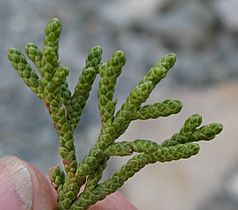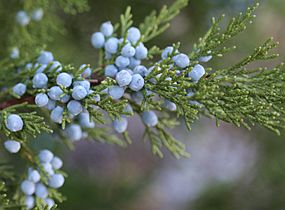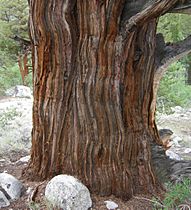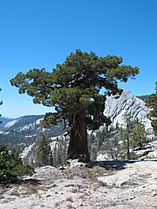Juniperus grandis facts for kids
Quick facts for kids Juniperus grandis |
|
|---|---|
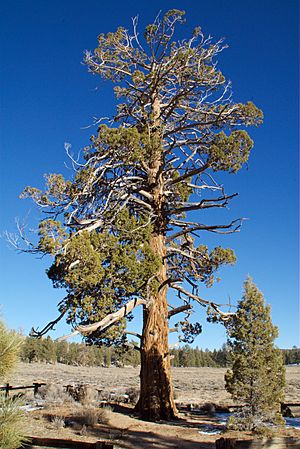 |
|
| Scientific classification |
|
| Kingdom: | Plantae |
| Clade: | Tracheophytes |
| Division: | Pinophyta |
| Class: | Pinopsida |
| Order: | Pinales |
| Family: | Cupressaceae |
| Genus: | Juniperus |
| Species: |
J. grandis
|
| Binomial name | |
| Juniperus grandis R.P.Adams
|
|
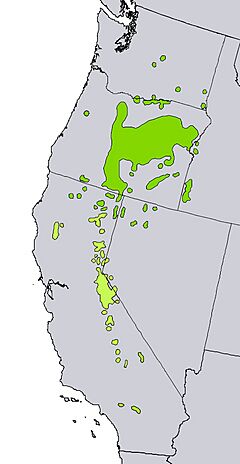 |
|
| Natural range in light green (dark green is Juniperus occidentalis) | |
| Script error: The function "autoWithCaption" does not exist. | |
| Synonyms | |
|
Juniperus occidentalis var. australis (Vasek) A.H. Holmgren & N.H. Holmgren |
|
Script error: No such module "Check for conflicting parameters".
Juniperus grandis, often called the Sierra juniper, is a special type of tree or tall bush. It grows only in the Western United States. Sometimes, people think of it as a close relative of another tree called Juniperus occidentalis, also known as western juniper.
Contents
What Does the Sierra Juniper Look Like?
The Sierra juniper is a medium-sized tree. It can grow between 12 and 26 meters (about 39 to 85 feet) tall. It has a strong trunk with reddish-brown bark. This trunk can grow up to 3 meters (about 10 feet) wide!
Its leaves are small and flat, like scales. They grow in a spiral pattern around the branches.
How Sierra Junipers Reproduce
Most Sierra juniper trees are dioecious. This means they have separate male and female trees. The male trees produce pollen, and the female trees produce seeds.
However, about 5 to 10 percent of these trees are monoecious. This means they have both male and female parts on the same tree.
The tree's cones look like small, fleshy berries. They are usually 5 to 9 millimeters (about 0.2 to 0.35 inches) wide. These "berries" are actually the tree's cones. The Sierra juniper releases its pollen in May and June. Its seeds do not have wings.
Where Does the Sierra Juniper Live?
The Sierra juniper is found in specific areas of the Western United States. It grows in the Sierra Nevada mountains in eastern California and western Nevada. You can also find it in the White and Inyo Mountains, the San Gabriel and San Bernardino Mountains. It also lives in higher parts of the Mojave Desert mountains in Southern California.
Sierra Juniper's Home Environment
This tree likes to grow in dry, rocky places that are open to the sun. It is often found in areas called pinyon-juniper woodlands. These are forests with both pine trees and juniper trees. It also lives in Temperate coniferous forests.
You can find Sierra junipers at many different heights. They grow from 100 meters (about 328 feet) up to 3,100 meters (about 10,170 feet) above sea level.
Images for kids
-
Bennett Juniper, which is known as the largest juniper tree.


